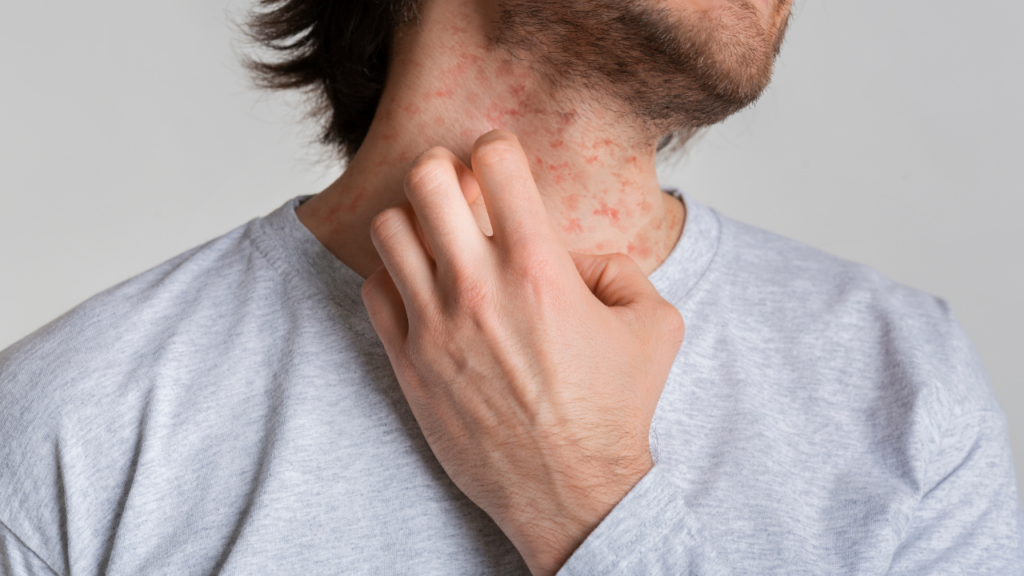Have you ever experienced that relentless urge to scratch your skin, consuming your thoughts and stealing the joy from your day? If so, you are not alone. Skin itching, scientifically referred to as pruritus, is a persistent nuisance that affects countless individuals around the world. It can take a toll on your physical and emotional well-being, making even the simplest tasks feel unbearable.
But worry not, because in this article, we will explore the causes behind skin itching and provide you with valuable insights on how to find the cure you seek. Whether it’s dry skin, allergies, or underlying health conditions, we will unravel the mysteries and offer effective remedies to soothe your itchy woes.
The journey to relief starts with understanding the root causes of skin itching. From dryness and eczema to insect bites and fungal infections, there are various culprits that trigger that maddening sensation on your skin. By identifying these triggers, we can then embark on a path of healing and restoration.
So, let us embark on this journey together, armed with knowledge and a determination to bid farewell to the incessant itching. Read on to uncover the causes and cures for skin itching, and take that first step towards reclaiming your comfort and peace of mind.
The Common Culprits Behind Skin Itching
There are several common culprits behind skin itching. These include:
- Dry skin (xerosis): Dry skin is a common cause of itching, especially during colder months or in dry climates. It can be relieved with moisture-rich creams and avoiding hot showers.
- Eczema: Eczema is a chronic inflammatory skin condition that can cause intense itching. Treatment options include topical creams, moisturizers, and avoiding triggers.
- Allergies: Allergies to environmental allergens or certain substances like cosmetics or jewelry can trigger itching. Identifying and avoiding these allergens is crucial for relief.
- Insect bites: Mosquitoes, bed bugs, and other biting insects can cause localized itching. Applying insect bite creams or using ice packs can help alleviate the itch.
- Fungal infections: Athlete’s foot, jock itch, and other fungal infections can lead to itching. Antifungal creams or powders are commonly used to treat these infections.
Identifying the specific culprit behind the itching is essential for effective treatment and relief. If the itching persists or worsens, it is recommended to consult a healthcare professional for further evaluation and guidance.
Effective Treatments and Remedies for Skin Itching
When it comes to addressing skin itching, there are various effective treatments and remedies that can provide relief and soothe the discomfort. Whether the itching is caused by dryness, allergies, or underlying health conditions, finding the right approach can bring much-needed relief. Here are some key treatments and remedies to consider:
Maintaining Skin Hydration to Combat Dryness
One of the primary causes of skin itching is dryness. To combat this, it’s essential to maintain proper skin hydration. Here are a few tips:
- Regularly apply moisturizers to keep the skin hydrated
- Avoid hot baths or showers, as they can strip the skin of natural moisture
Topical Treatments: Ointments and Creams
Topical treatments in the form of ointments and creams can be highly effective in providing relief from itching. These products work by moisturizing the skin and reducing inflammation. Consider the following options:
- Ointments containing ingredients like aloe vera or hydrocortisone
- Anti-itch creams with menthol or calamine
Advanced Medical Treatments for Chronic Conditions
In cases of chronic itching or when other remedies fail to provide relief, advanced medical treatments may be necessary. Consulting with a healthcare professional is crucial to determine the most appropriate treatment options. Some options include:
- Oral antihistamines
- Corticosteroids to reduce inflammation
- Immunosuppressants for severe and persistent itching
| Treatment Option | Description |
|---|---|
| Oral Antihistamines | These medications can help block the histamines that cause itching and provide relief. |
| Corticosteroids | Topical or oral corticosteroids can effectively reduce inflammation, relieve itching, and promote healing. |
| Immunosuppressants | For chronic cases, immunosuppressant drugs can help suppress the immune system’s response, reducing inflammation and itching. |
It’s important to note that self-diagnosis and self-medication can be risky. Always consult with a healthcare professional for proper diagnosis and guidance on the most suitable treatment options for your specific case of skin itching.
Coping with Dermatological Conditions: Eczema and Psoriasis
Dermatological conditions such as eczema and psoriasis can be challenging to cope with due to significant itching and discomfort. However, there are effective strategies and treatment options available to manage these conditions and reduce itching.
Tailored Skincare Routines for Sensitive Skin
Developing a skincare routine tailored to sensitive skin is essential for managing dermatological conditions like eczema and psoriasis. This involves using gentle cleansers and hypoallergenic moisturizers that do not irritate the skin.
It is also important to avoid potential triggers or irritants, such as harsh chemicals or fragrances found in skincare products. By following a personalized skincare routine, individuals can help alleviate itching and maintain healthier skin.
Prescription Medications and Biologic Agents
In more severe cases of eczema or psoriasis, dermatologists may prescribe prescription medications or biologic agents to manage symptoms and reduce itching.
Prescription medications may include topical corticosteroids, calcineurin inhibitors, or immunomodulators, which can help reduce inflammation and soothe itching.
Biologic agents, such as targeted immune therapies, work by targeting specific molecules involved in the inflammatory response and provide effective relief for individuals with moderate to severe eczema or psoriasis.
Light Therapy as a Non-Medicinal Approach
Light therapy, also known as phototherapy, is a non-medicinal approach that can effectively manage itching and inflammation associated with eczema and psoriasis.
This treatment involves exposing the skin to specific wavelengths of ultraviolet light under medical supervision.
Phototherapy can help reduce itching, improve skin appearance, and promote overall healing.
This treatment option is often considered for individuals who cannot tolerate or do not respond well to other forms of treatment.
| Treatment Option | Description |
|---|---|
| Tailored Skincare Routines | Using gentle cleansers, hypoallergenic moisturizers, and avoiding triggers or irritants. |
| Prescription Medications | Topical corticosteroids, calcineurin inhibitors, or immunomodulators prescribed by dermatologists. |
| Biologic Agents | Targeted immune therapies for moderate to severe eczema or psoriasis. |
| Light Therapy | Exposing the skin to specific wavelengths of ultraviolet light to reduce itching and inflammation. |
By utilizing tailored skincare routines, prescription medications, and light therapy, individuals can effectively cope with dermatological conditions like eczema and psoriasis, alleviating itching and improving their overall quality of life.
Allergic Reactions and Irritations Leading to Skin Itching
Allergic reactions and irritations are common causes of skin itching. One type of allergic reaction is allergic contact dermatitis, which occurs when the skin comes into direct contact with an allergen. This contact leads to an inflamed and itchy rash.
Common allergens that can trigger this reaction include certain metals, fragrances, cosmetics, and fabrics. To prevent allergic reactions and subsequent itching, it is important to avoid these triggers and use hypoallergenic products.
In addition to allergic reactions, irritants can also cause skin irritation and itching. Certain chemicals, soaps, or detergents can be irritating to the skin, leading to discomfort and itching sensations. It is essential to identify and avoid these irritants to alleviate itching and prevent further skin irritation.
Table: Common Allergens and Irritants
| Allergens | Irritants |
|---|---|
| Certain metals (e.g., nickel) | Certain chemicals |
| Fragrances | Soaps |
| Cosmetics | Detergents |
By avoiding allergens and irritants and using gentle, hypoallergenic products, you can help prevent skin itching and minimize discomfort. If you experience persistent or severe itching, it is recommended to consult with a dermatologist or healthcare professional for further evaluation and appropriate treatment.
Lifestyle Changes and Home Remedies to Soothe Itching Sensations
If you’re experiencing itching sensations, there are lifestyle changes and home remedies that can help soothe the discomfort. Natural ingredients like aloe vera, coconut oil, and oatmeal have soothing properties that provide relief from itching.
Aloe vera gel can be directly applied to the affected area to reduce inflammation and itching. Similarly, applying coconut oil or oatmeal paste can moisturize the skin and alleviate itchiness. These natural remedies are easily accessible and can be effective in providing temporary relief.
Natural Ingredients for Itch Relief
When dealing with itching sensations, you can turn to natural ingredients for relief. Tea tree oil, known for its anti-inflammatory and antiseptic properties, can be diluted and applied to the itchy area to soothe the skin.
Also, witch hazel, with its astringent properties, can help reduce itching and inflammation. Calendula, a flower with skin-soothing properties, can also be used in the form of creams or ointments to ease itchiness. Remember to perform a patch test before using any natural ingredient to ensure you do not have an adverse reaction.
Nutrition and Hydration’s Role in Skin Health
Nutrition and hydration play a vital role in maintaining skin health and combating dryness that often leads to itching.
Consuming a balanced diet rich in vitamins and minerals supports overall skin health. Incorporate foods like fruits, vegetables, whole grains, and lean proteins into your meals.
Additionally, drinking an adequate amount of water throughout the day helps keep your skin hydrated, reducing the likelihood of dryness and itching. Remember to limit your intake of unhealthy fats, sugary foods, and processed snacks as they can worsen skin conditions and contribute to itchiness.
Stress Management Techniques to Reduce Itching
Managing stress is crucial in reducing itching sensations. Stress can trigger or worsen skin conditions, leading to increased itchiness.
Incorporate stress management techniques into your daily routine to find relief. Practicing meditation, deep breathing exercises, or yoga can help relax your mind and body, reducing stress levels.
Engaging in regular physical activity, such as brisk walking or cycling, can also be beneficial in managing stress and promoting overall well-being. Remember to prioritize self-care and allocate time for activities that bring you joy and relaxation, as these can have a positive impact on your skin’s health and reduce itching.


